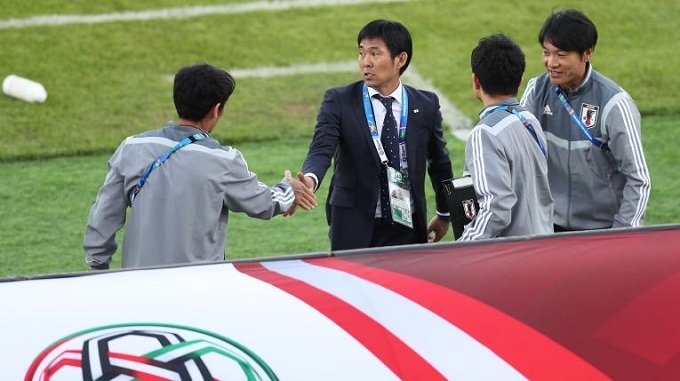


|
: |
|
|
With the
two teams potentially 90 minutes away from creating history, the-AFC.com
breaks down some of the key facts and details ahead of what promises to be a
match to remember.
Showpiece
specialists meet first timers
Japan are
the competition's most successful nation, becoming champions four times since
breaking through for their first Asian title on home soil in 1992, but they
also boast a perfect record in the AFC Asian Cup final, having won in all
four of their previous appearances in the decider.
In fact,
they have only conceded one goal in the showpiece, in their 3-1 win against
China PR in 2004, and three of their four wins have come in regulation time,
with Tadanari Lee's extra-time winner against Australia in 2011 the only
exception.
Conversely,
the final will be completely new territory for Qatar who had never previously
made it beyond the quarter-final stage.
While this
is the first senior final at the continental level for Al Annabi, a number of
their personnel, including head coach Felix Sanchez and star players such as
Almoez Ali, Akram Afif and Tarek Salman, won the AFC U-19 Championship in
Myanmar in 2014.
All eyes on
Ali, but Osako looms for Japan
There is
little doubt that Almoez Ali has been one of the revelations of the
competition, scoring eight goals from six matches to equal Ali Daei's
23-year-old AFC Asian Cup record.
His
achievements are all the more notable given that, playing primarily as a
winger, he scored just once in his previous 13 appearances for club side Al
Sadd.Barring a staggering turn of events in the final, Ali will be the first
Qatari player in history to claim the competition's top scorer award, having
already won the same title at the AFC U-23 Championship in China last year.
Qatar also
feature the man with the most assists, with Akram Afif having set up a highly
impressive eight goals, and creating a tournament-high 20 chances for his
teammates, six more than any other player.
While Ali's
performances have demanded attention, Japan have a potent attacking weapon of
their own in Yuya Osako, who returned from injury to score two crucial goals
in his side's 3-0 semi-final win over Islamic Republic of Iran.
Despite Ali
being four goals clear at the top of the scoring charts, Osako, who has made
just three appearances at UAE 2019, has been more efficient, scoring a goal
every 53.5 minutes of game time, compared to Ali's rate of one every 66
minutes.
Moriyasu
chasing dual firsts
Japan head
coach Hajime Moriyasu was part of the playing squad when his country first
became Asian champions in his home city of Hiroshima back in 1992, and will
become the first man in history to win the title as a player and head coach
if his side prevail in the final
Perhaps
surprisingly, Moriyasu will also become the first Japanese head coach to win
the AFC Asian Cup, with the nation's previous successes coming under head
coaches from the Netherlands, France, Brazil and Italy.
Head to
head? Neck and neck
Four
previous meetings in the AFC Asian Cup have produced one win for reach team,
with the other two matches ending in stalemates.
Qatar won
the first Finals encounter between the sides, defeating Japan 3-0 in the
Samurai Blue's first appearance in 1988, before a 1-1 draw in Lebanon in
2000, a result which was repeated in Hanoi seven years later.
Japan won
the most recent meeting between the sides, knocking Qatar out of the 2011 AFC
Asian Cup they hosted with a 3-2 quarter-final win
Every man
available
With
outstanding disciplinary records wiped at the end of the quarter-finals, and
no Japanese or Iraqi players picking up red cards in the semi-finals, all
players are eligible to appear in the final.
For Qatar,
this will mean the return of quarter-final hero Abdelaziz Hatim and
impressive 21-year-old Bassam Al Rawi.
|
Source: NDO